What unites us: 10 reasons why we're not a divided nation
- Published

Much of the talk since the Brexit referendum has been of a nation divided, split by geography, income, education and age.
But despite the Remainer v Leaver rhetoric, most people in the UK actually appear to agree on a wide variety of subjects, and share an increasingly socially liberal outlook.
Here are 10 subjects that unite most of us in Britain, according to recent polling.
1. Being faithful to our partners

Almost all of us Britons - 99% - feel "some" or "significant" responsibility to be faithful to our partners, a ComRes survey for BBC News suggests.
Women appear more likely to feel significant responsibility than men - of those surveyed, 86% of women felt significant responsibility, compared with 79% of the men.
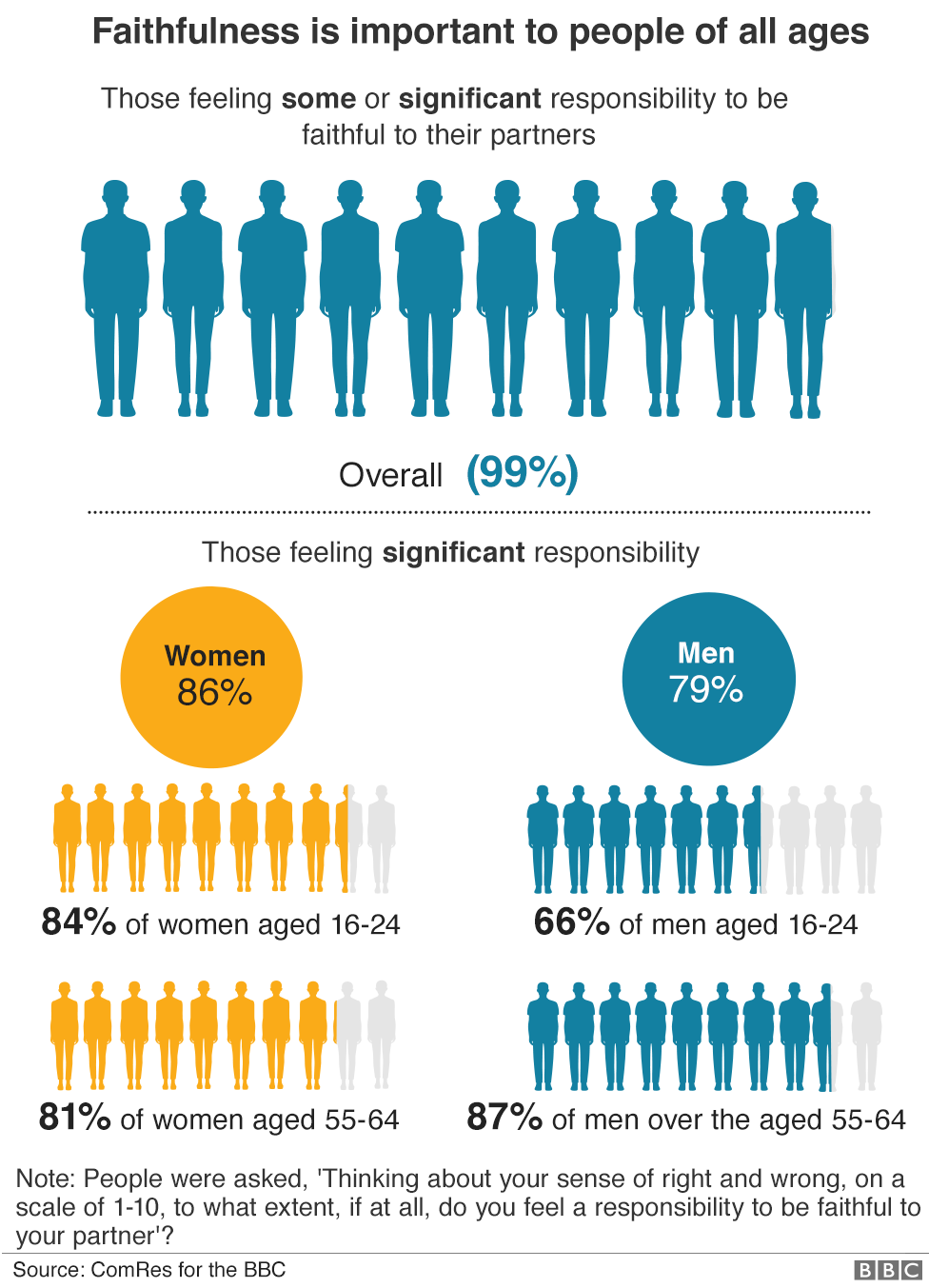

Among the men surveyed, those in older age brackets were more likely to feel significant responsibility than those in younger groups. Some 87% of the men over the age of 55 felt this level of responsibility, compared with 66% of those aged 16-24.

2. The principle of equal pay

There is almost universal support for the principle of equal pay between men and women, the annual British Social Attitudes (BSA) survey suggests.


There were differences in the strength of opinion between men and women, however, with 78% of the women surveyed considering this pay inequality "very wrong", compared with 57% of the men.

3. Viewing a woman's role as no longer in the home

Three-quarters of Britons reject the idea women should be "homemakers" and men should be "breadwinners", external, according to BSA data.
Not only did those surveyed see women as having a role outside the home, they were also unlikely to see particular roles as being men's or women's work.
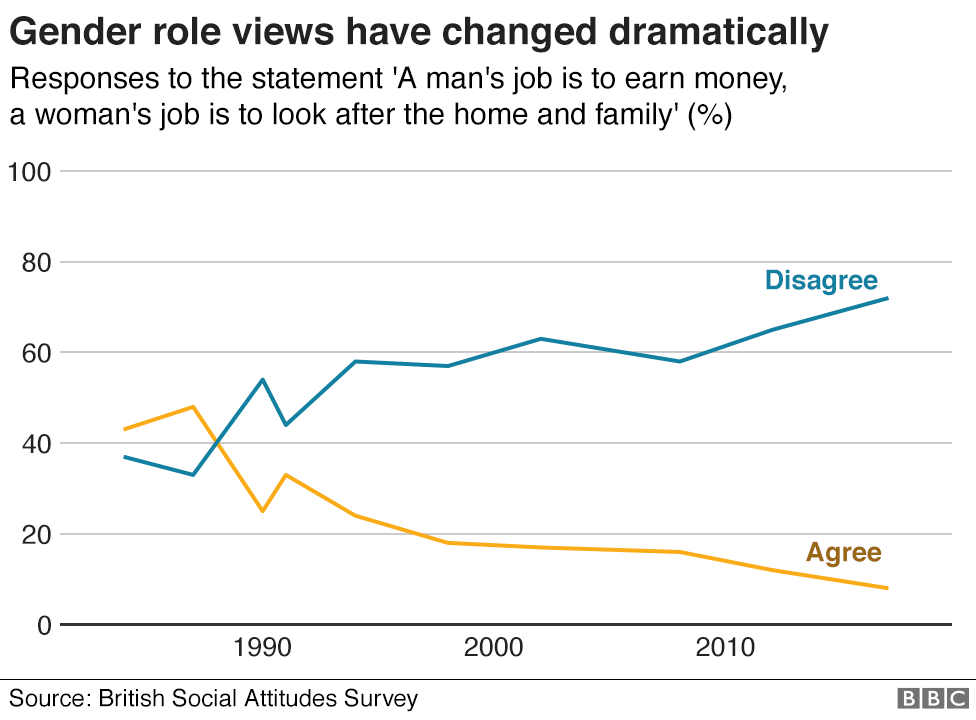
Most of us also think men and women are mostly equally suited to working in a wide range of roles, including doctor, councillor and MP, the BSA survey suggests.
About half said men and women were "equally suited" to "all" or "almost all jobs", with a further third saying men and women were equally suited to "most jobs".
Four in 10 said a mother should take most of a parental leave period, with the father taking some. A third said it should be shared equally between both parents.
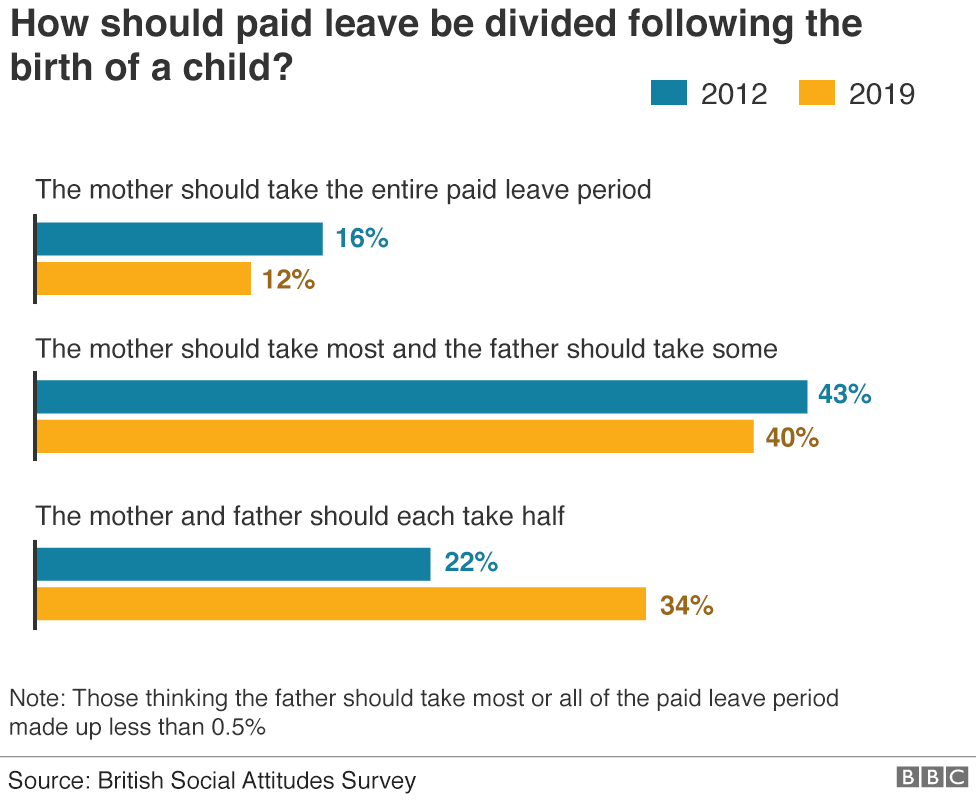

Nancy Kelley, deputy chief executive of Natcen Social Research, which carries out the British Social Attitudes survey, says the shifts in attitudes towards women's roles and rights, as well as sexual relationships, are one of the "most striking stories" seen in the survey over the past few decades.
And while it may appear politically divided right now, particularly around Brexit, the country remains "very, very united" on a number of social issues.
"On all of those kinds of things we've become increasingly socially liberal," she says. "This is very different from the US, where alongside very political divides, you see what you might describe as a 'culture war' - we don't see that at all in our data."
Such trends are longstanding and researchers expect them to continue, she adds, suggesting Britons will continue to agree on some of the fundamental social issues in the UK.

4. Seeing gay relationships as 'not wrong at all'

Two-thirds of Britons say sex between two adults of the same sex is "not wrong at all", external, according to the BSA survey, an increase of almost 50% since the question was first asked, in 1983.
It suggests approval for same-sex relationships has risen steadily after a fall in the mid-1980s - the time of the Aids crisis and the government's "Don't die of ignorance," campaign.
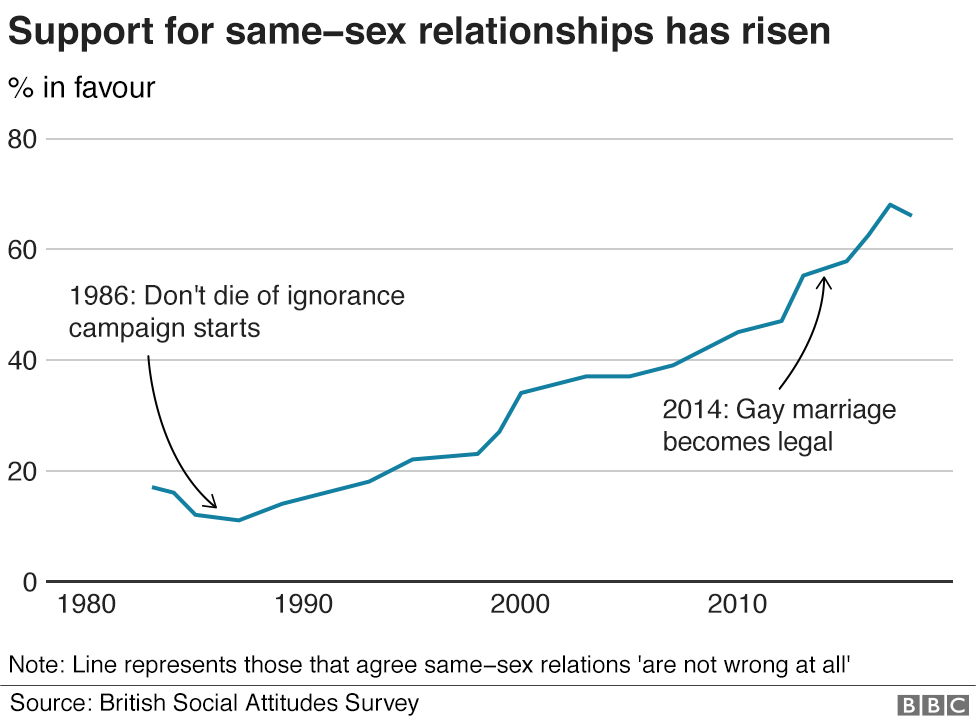
According to the BSA researchers, this rise is not just down to a generational change: older people too have become more liberal in their views, and so have those who do not follow a religion.
However, the BSA survey does note the liberalisation in attitudes to sexual relationships appears to be slowing down., external
The proportion of respondents stating sexual relations between two adults of the same sex are "not wrong at all" has remained at about two-thirds (64%, 68% and 66%) for the past three years.
Researchers say this suggests a significant minority of people remain uncomfortable with same-sex relationships. This is, perhaps, "reflecting the marked divides between the attitudes of religious and non-religious people", they say.

5. Supporting a woman's right to have an abortion

There is near unanimous support (92% in 2016) for abortions when a woman's health is in danger, according to the BSA survey. And since 2005, support for allowing an abortion if the woman does not wish to have a child has increased from 60 to 69%.
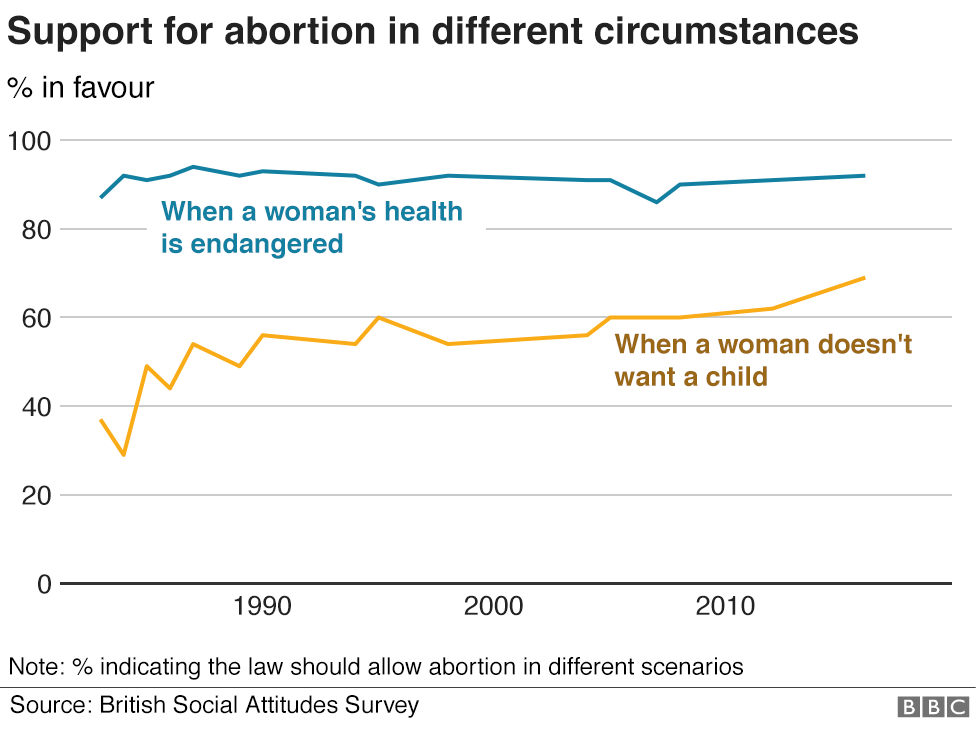

6. Trusting science and scientists

More than eight in 10 Britons trust university scientists "to do their work with the intention of benefitting the public" and 67% trust company scientists to do the same, according to the BSA survey.
An even higher percentage - 94% - believe medical research in particular will "lead to an improvement in the quality of life" over the coming decades.
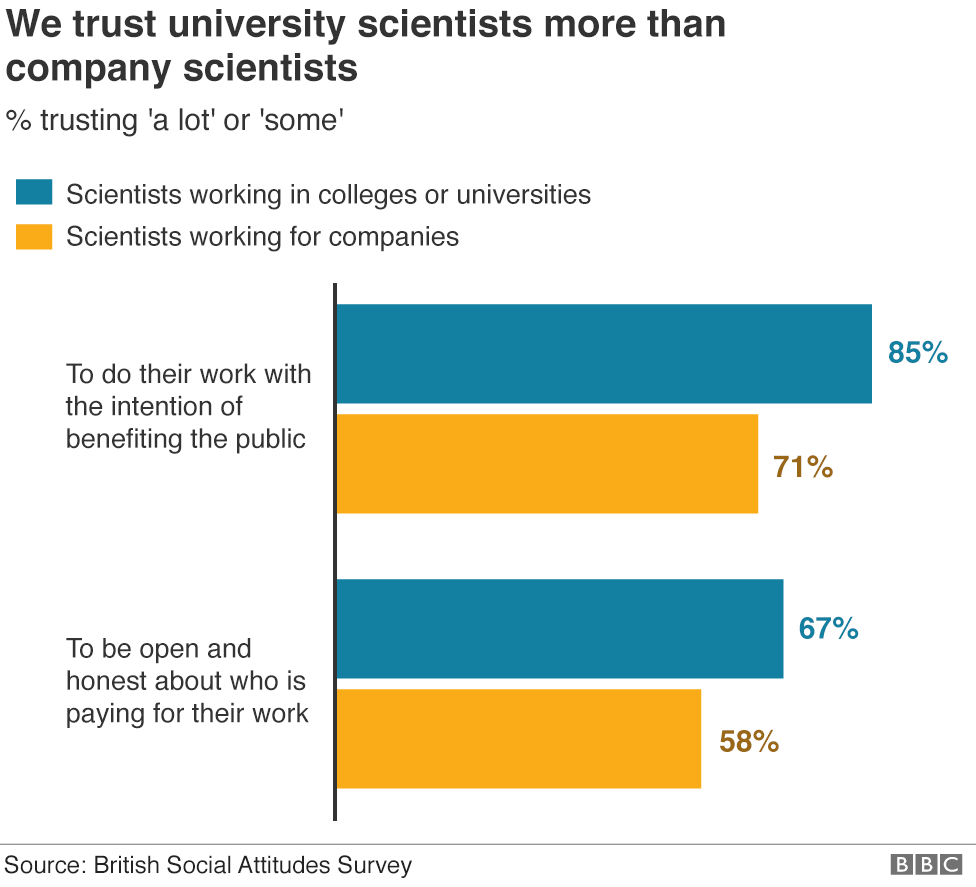

Graduates and those in managerial and professional occupations have a particularly high level of trust in university scientists at 90%, compared with 73% of those with no qualifications.
There is little evidence of a "disenfranchised population turning against the institutions of science", BSA researchers say, despite popular accounts of declining trust in "experts".

7. Believing in the NHS

Almost eight in 10 people (77%) believe the NHS is crucial to British society, external, according to a survey by Ipsos Mori for the King's Fund think-tank.
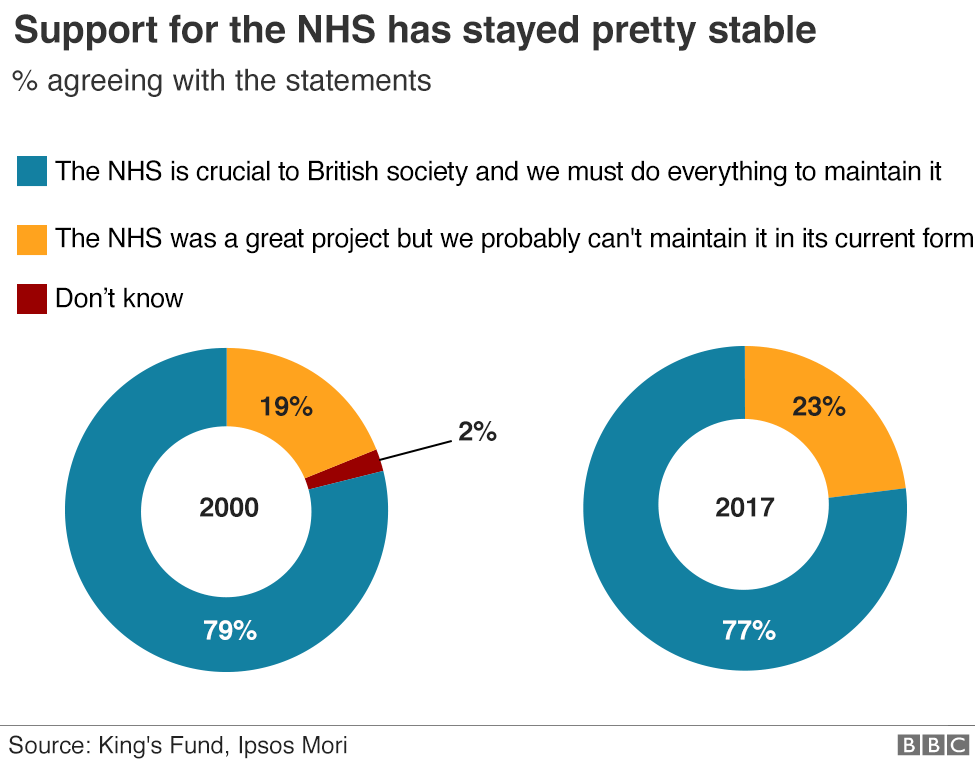

This support has remained constant through changes in government and fluctuations in the economy.
About 90% also support the NHS's three founding principles - that it should be free at the point of delivery; provide a comprehensive service available to everyone; and be primarily funded through taxation. Perhaps more surprisingly, two-thirds are also prepared to pay more tax to maintain the level of spending needed to keep the NHS going.
However, satisfaction with the service appears to be dropping, according to the British Social Attitudes Survey. Overall satisfaction was 53% in 2018 - a three percentage point drop from the previous year and the lowest level since 2007.

8. Believing the Royal Family is important
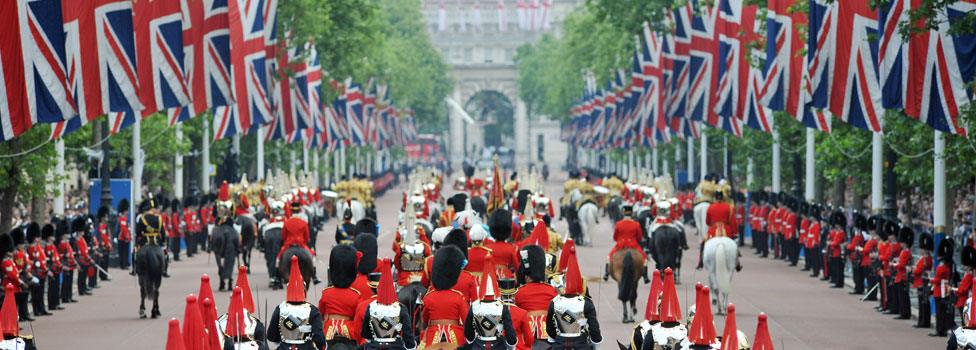
More than seven in 10 Britons believe it is "very" or "quite important" for the country to continue to have a monarchy, according to the BSA survey.
However, the size of this majority did shrink significantly between the 1980s and 1990s, before growing again in the 2000s.
In 1983, more than 86% were in favour of the monarchy. But this figure fell to 66% in 1994 - around the time of the Prince of Wales' separation from Diana, Princess of Wales, and ahead of her death in a car accident, in 1997.
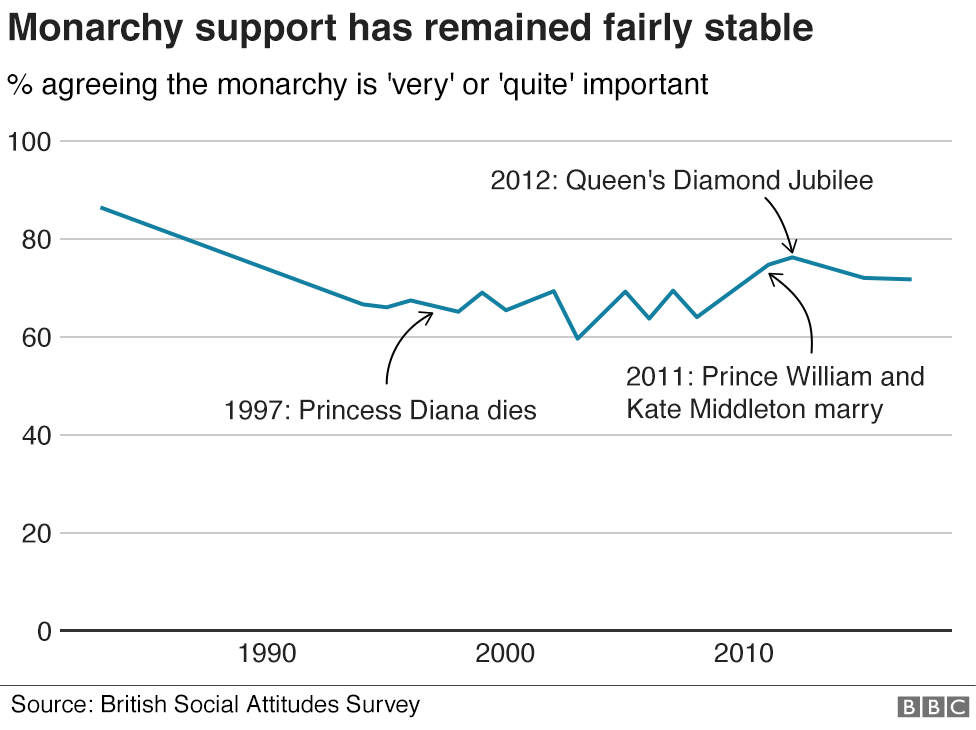
But public opinion rose again following a low in 2003, to reach 76% in 2012 - the year of the Queen's Diamond Jubilee.
Britain has marked a number of other royal milestones in the past few years: the Duke and Duchess of Cambridge's wedding, in 2011, and that of the the Duke and Duchess of Sussex, in 2018, as well as a number of royal births.

9. Thinking climate change is at least partly caused by humans

As many as 95% of Britons think climate change is at least partly due to human activity, according to the 2018 European Social Survey (which conducts research across Europe).
Some 36% say it is "mainly" or "entirely" due to human activity, while 53% think human and natural causes are equally to blame.
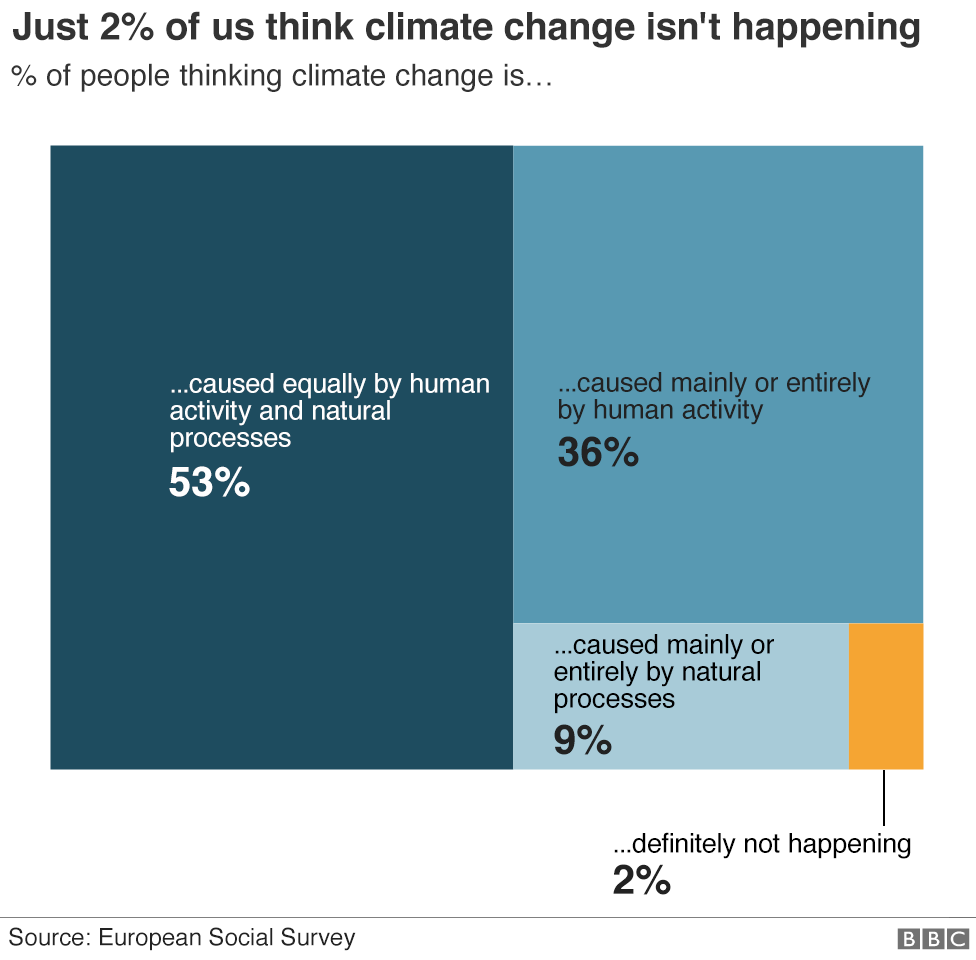

Just 2% say climate change "definitely is not happening".

10. Loving David Attenborough, health charities, Heinz, Lego, Google Maps and Maltesers
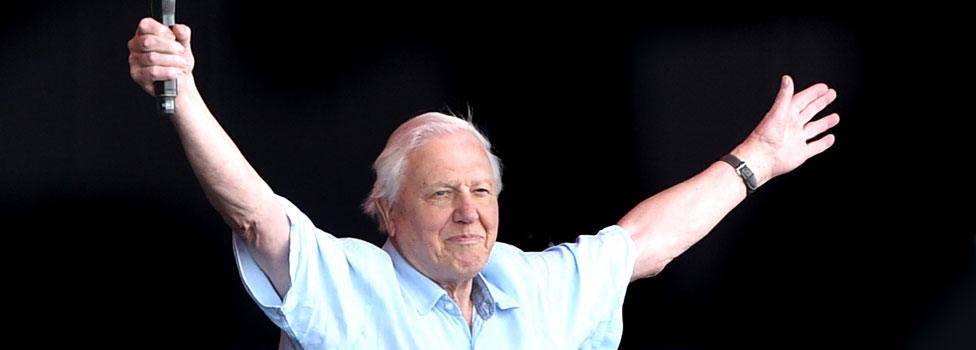
When it comes to things - rather than social views - celebrities, charities and food dominate the collective most-loved list, according to YouGov.
David Attenborough comes top, with a massive 87% approval, its polling suggests., external
And he is followed on its most-popular-things list by a number of health charities, including the St John Ambulance Brigade (87%) and Macmillan Cancer Support (86%) and actor Tom Hanks (84%).
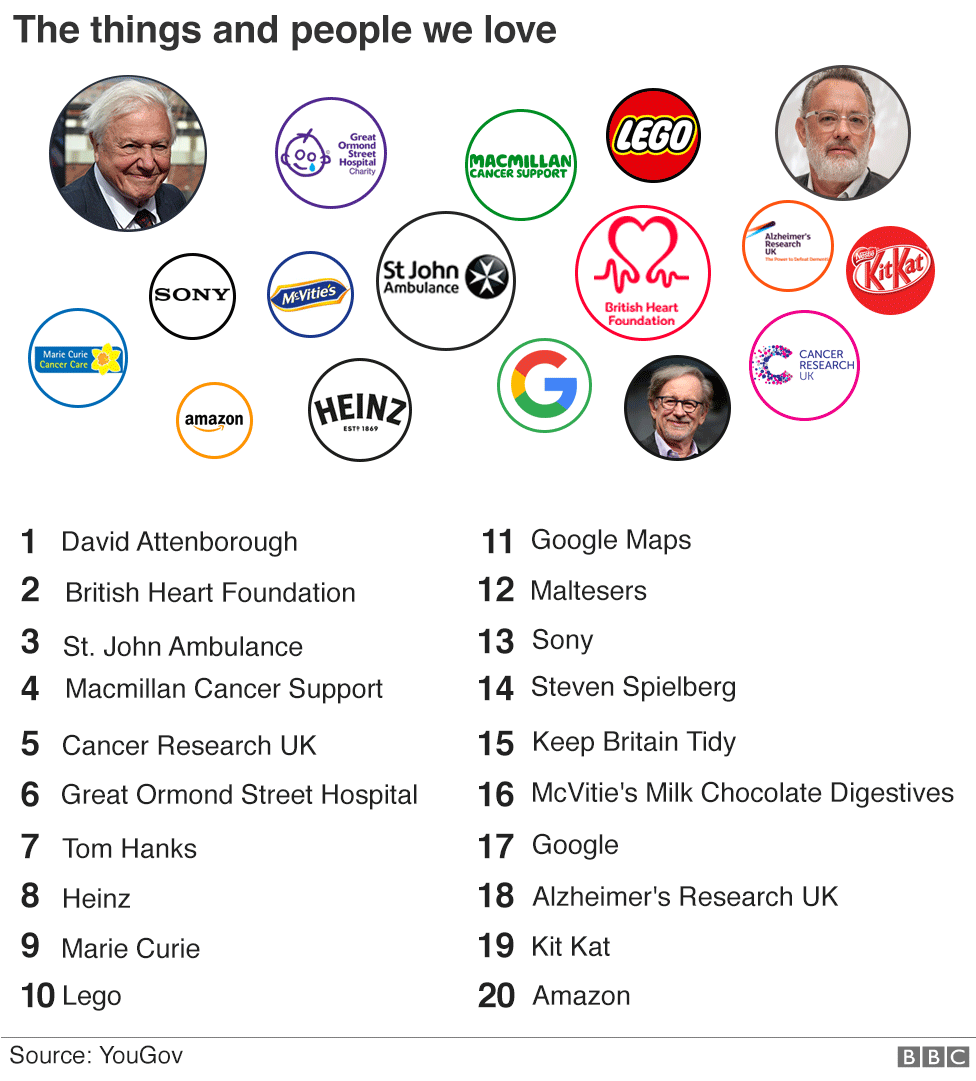

Overall, 19 of the top 100 entries are charities. A quarter are people - mainly actors - and a quarter are foods.

PS: Leavers and Remainers may not be so far apart
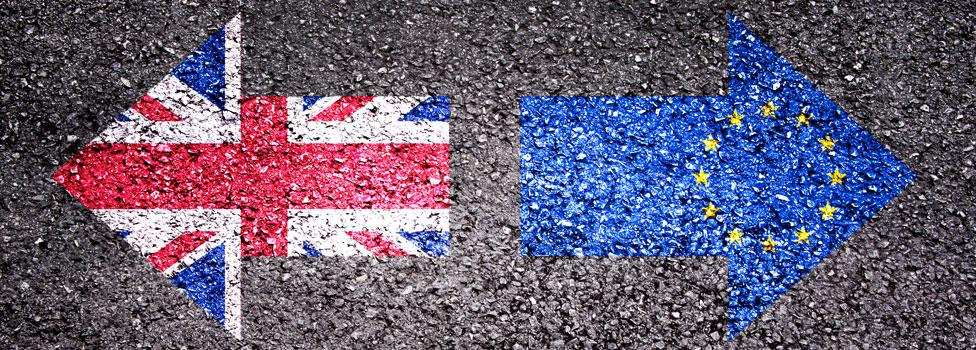
A study by Dr Paul Hanel, research associate at Bath University's department of psychology, suggests those on either side of the Brexit argument actually agree on a wide range of subjects., external
His research indicates the views of Leavers and Remainers are actually 90% similar across a number of topics, including poverty, climate change, housing, British identity, life satisfaction, the importance of involvement in communities.
Even on subjects viewed as the most divisive, such as attitudes to immigrants and national identity, the two groups showed more than 50% similarity, Dr Hanel says.
He says a focus on "differences" means we overstate the gap between Leavers and Remainers, and that the evidence that they have more in common may help heal the wounds caused by the Brexit debate.
"Its easier to talk to someone else if there are more similarities between you than you might expect," , Mr Hanel says.
Design by Mark Bryson, Joy Roxas and Sana Jasemi.

BBC Crossing Divides

A season of stories about bringing people together in a fragmented world.

- Published21 November 2019
